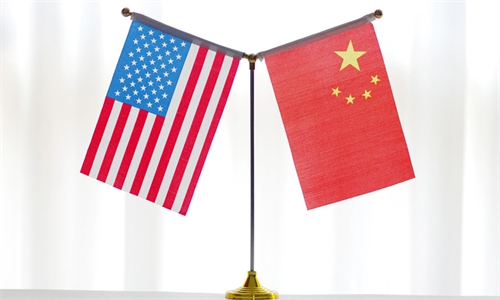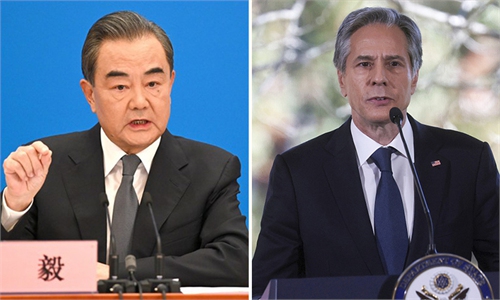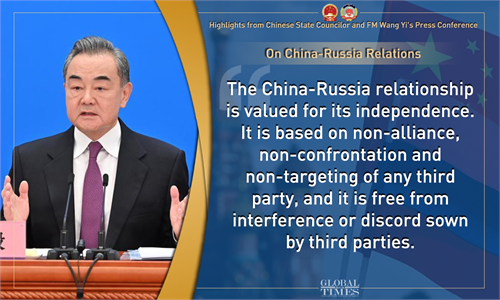FM showcases China's strategic composure amid complex global situation
6-point initiatives on Ukraine, stance on major power ties show wisdom

Chinese State Councilor and Foreign Minister Wang Yi attends a press conference on China's foreign policy and foreign relations via video link on the sidelines of the fifth session of the 13th National People's Congress at the Great Hall of the People in Beijing on March 7, 2022. Photo: The Paper
Within 100 minutes, Chinese State Councilor and Foreign Minister Wang Yi responded to 27 questions on China's diplomacy and foreign relations, including on the Ukraine crisis, China-US relations, China-Russia ties and the Afghanistan situation, fully underscoring China's strategic composure amid growing uncertainties on the global stage, and its firm determination to handle complex international affairs in accordance with its own pace and agenda.
It was also a time to show the world the fundamental stance of China as a major power on global governance and regional affairs, particularly when regional conflicts emerge and escalate such as the ongoing Ukraine crisis, the international community eagerly needs China's wisdom and solutions given the role the country has played in multilateralism and China's interest in various spheres, experts said.
However, due to the US-led West bloc's continuous slandering of China's image and misinterpreting its solutions to global governance, China has seen more challenges over the past year in handling global issues of concern and expressing its diplomacy, which is based on the principle of balance, mutual benefit and effectiveness, rather than being led by stances of certain countries or interference from third parties.
"All the 27 questions cover various aspects including relations between major powers, regional issues and global governance. They are a very comprehensive and overall expression of China's approach, demonstrating the wisdom and responsibilities of China," Li Haidong, a professor from the Institute of International Relations of China Foreign Affairs University, told the Global Times on Monday.
Growing complex situation
As the Ukraine crisis continues to attract global attention, some Western media hyped China's fundamental stance on the issue by asking whether China could have done more or whether it's disappointed by Russia's military operation, despite Beijing has stated its position on the issue on multiple occasions.
"China believes that the more tense the situation, the more important the talks. The wider the disagreement, the greater the need to sit down and have negotiations," Wang told a press conference on Monday on the sidelines of the fifth session of the 13th National People's Congress in Beijing.
Wang also laid out six-point initiatives on preventing a large-scale humanitarian crisis in Ukraine. Wang said that efforts should be made to ensure that humanitarian operations abide by the principles of neutrality and impartiality, and avoid politicizing humanitarian issues.
Full attention should be given to the displaced people in and from Ukraine, and provide them with proper shelter, Wang said, while calling for ensuring the protection of civilians and preventing secondary humanitarian disasters in Ukraine.
Efforts should also be made to provide for safe and smooth humanitarian aid activities, allow foreign nationals in Ukraine safe departure and support the United Nations' coordinating role in channeling humanitarian aid and its work of the crisis coordinator for Ukraine, Wang added.
Besides reiterating China's fundamental position of advocating for dialogue and solving the crisis through peaceful means, Wang focused on urging the relevant parties to deal with the humanitarian crisis, which is the area where the international community needs to cooperate with the most, given the parties still have much divergence, which could create more humanitarian crises, Cui Hongjian, director of the Department of European Studies at the China Institute of International Studies, told the Global Times on Monday.
The Chinese official also said on Monday that the Red Cross Society of China will provide emergency humanitarian supplies to Ukraine as soon as possible.
"It also showed that China always takes practical moves, aiming to solve the problem, not engage in empty talk," Cui said.
Instead of falling into the trap set by some Western media and observers, China has been following its own pace and agenda of mediating in issues like the Ukraine crisis, experts said. "The Western media set up its own standards to evaluate China's action on the Ukraine situation. For example, whether China follows the West-led sanctions on Russia, whether China follows the West-led condemnation of Russia or whether China persuades Russia for a ceasefire," Cui said, noting that China, however, has not been influenced by those unilateral standards.
"Instead, China has been doing everything it can to promote dialogue, which is seen as the only correct way to end conflicts and divergences," he said.
Wang laying out China's fundamental stance in a comprehensive way with six-point initiatives is considered a vivid example of how China's diplomacy and its relations with other major powers are decided by its own judgment in accordance with the merits of the matter without blindly following other countries' stances, experts said.
True multilateralism
China's diplomatic philosophy is formulated by China with a high sense of responsibility and China's willingness to contribute to a community with a shared future for mankind. This is in line with the general trend of the times, Li said, noting that it also reflects that the destiny of every country is connected with each other closely, and the Cold War mentality-driven small clique leads nowhere.
On relations with major powers like Russia, Wang told the press conference that China-Russia relationship is valued for its independence, and the friendship between the two peoples is "rock-solid." China-Russia ties are based on non-alliance, non-confrontation and non-targeting of any third party, and are free from interference or discord sown by third parties.
When it comes to China-US relations, the Chinese foreign minister said the US is going to great lengths to engage in intense, zero-sum competition with China, provoke China on issues concerning China's core interests and draw small circles to contain China, a move that not only hurts bilateral relations but damages international peace and stability.
Major-country competition should not be the order of the day and a zero-sum game is not the right choice. In a globalized and interdependent world, how China and the US find the right way forward and manage to get along is both a new question for humanity and a formulation that must be worked out by China and the US, Wang said.
Wang's remarks showcased China's clear stance in upholding true multilateralism and not the small circles that the US government is touting for, because piecing together small blocs will lead to confrontations and clashes. Only by choosing true multilateralism can the world regain stability and peace, Yang Xiyu, a senior research fellow at the China Institute of International Studies, told the Global Times.
China's policy toward the US is consistent and for the interests of people from the two countries and the world. It never aims to compete with the US or other countries but to seek peaceful coexistence with other countries, Yang said, noting that this is also what the Chinese foreign minister wanted to reiterate at Monday press conference.
In responding to the small circles that the US is drawing around China, China is and will always insist on its own path of making friends, not seeking alliances. Unlike the US which is playing cards of confrontations and clashes, China is promoting multilateralism, cooperation and development, Yang said.
Yang said that time and practices will prove which country, China or the US, is bringing peace and stability to the region and the world.
Over the past year, the major accusation on China's diplomacy was concentrated on three aspects: misinterpreting China's assistance to other countries as geopolitical tools, distorting China-proposed Belt and Road Initiative as debt traps, and fueling tensions around China's neighboring countries such as China-ASEAN relations, the South China Sea and Korean Peninsula issues, experts said.
"The US has been interfering in regional affairs from the Korean Peninsula issue to the South China Sea, as an extraterritorial country. On the Ukraine crisis, certain countries have been fueling tensions," Li said.
The Biden administration has also been dividing the world in the name of democracy. We've seen bad records of human rights in the US, and more countries have realized the hypocrisy and damage of the US' manipulation of human rights, Li said.
"The Asia-Pacific should not be a chessboard for major power rivalry," Wang said, noting that China, along with neighboring countries such as Japan and South Korea, in addition to the ASEAN, need to follow the trend, being partners rather than rivals.
"A main topic that has been reiterated during today's conference is opposition to geopolitical rivalry, to Cold War mentality and to small clique-driven politics," Li said, noting that China's diplomacy has been underscoring true multilateralism about cooperation and coexistence instead of divisions and confrontation at the cost of other countries.



